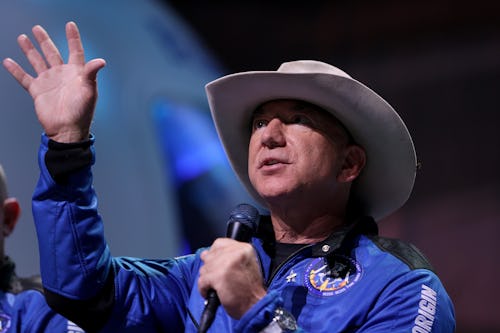
The richest amongst us are loving the latest space tourism boom, and industry leaders like Jeff Bezos’s Blue Origin love to tout statistics about how little carbon dioxide their flights release into the atmosphere. Those quick jaunts into space aren’t exactly climate-neutral, though.
Scientists have suspected that space flights could be contributing to climate change even when they don’t utilize traditional CO2-spouting jet fuels. Other particles produced by rockets could be irreversible damage to the ozone layer, according to a new study by University College London, the University of Cambridge, and Massachusetts Institute of Technology.
The research, which was published in the journal Earth’s Future, calls for urgent mitigation before the space tourism industry really takes off. “What we really need now is a discussion amongst experts on the best strategy for regulating this rapidly growing industry,” co-author Dr. Eloise Marais said.
About that soot... —
This research team found that rocket launches are actually far worse for the planet than your typical flight on an airplane. That’s because the launches give off “black carbon” particles, also known as soot. Black carbon has a climate-warming impact between 460 and 1,500 times stronger than CO2 per unit of mass.
Though the damage caused by rocket-produced black carbon hasn’t done all that much to erode the planet’s ozone yet, researchers found that growth trends indicate that the upper stratospheric ozone layer in the Arctic will be damaged sooner rather than later. We’re talking about black carbon being injected right into the upper atmosphere.
The research team created models to forecast just how quickly the space tourism industry could pose a real risk to the ozone layer. The amount of warming due to soot will more than double in the next three years if continued unchecked, thanks in particular to the use of kerosene by SpaceX and hybrid synthetic rubbers by Virgin Galactic.
Is taxation enough? —
The ozone layer isn’t as much of a climate change talking point as it used to be, thanks to 1987’s Montreal Protocol, which banned substances that contribute to the depletion of ozone in the atmosphere. The upper stratosphere has shown significant recovery since the adoption of the Montreal Protocol — and that’s right where these rockets are leaving soot.
A handful of lawmakers have attempted to introduce a “space tax” that would charge passengers a premium on top of their rocket tickets. A 10 percent tax won’t remove all that soot from the atmosphere, though. Researchers are calling for more studies to be conducted on the influence of by-products of new fuels like liquid methane and bio-derived fuels.
“The conversation about regulating the environmental impact of the space launch industry needs to start now so we can minimize harm to the stratospheric ozone layer and climate,” said co-author Dr. Robert Ryan.







